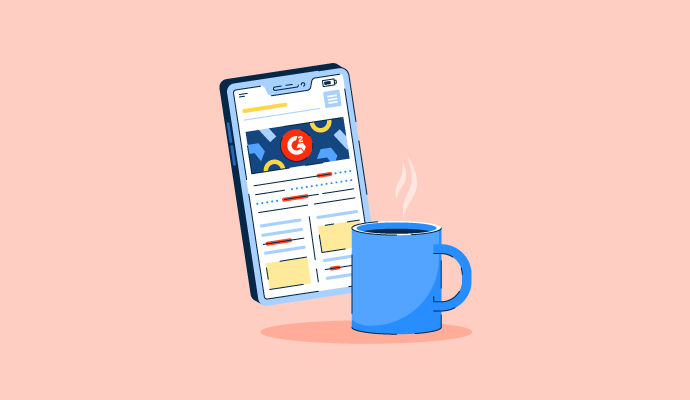May 28, 2025
 by Alexandra Vazquez / May 28, 2025
by Alexandra Vazquez / May 28, 2025

AI is no longer just helping B2B buyers; it’s making decisions for them.
The buyer’s journey is changing, and important purchasing decisions are happening before potential customers even get to your website. This new reality means that SEO isn’t enough. Your brand needs to be understood and endorsed by AI.
To get a better idea of how to start with this new tactic, we chatted with Jim Yu, Founder and Executive Chair of BrightEdge. In this interview, Jim reveals how AI is rewriting the rules of search, SEO, and buyer behavior and what marketers have to do to keep up as AI becomes the new gatekeeper of B2B decision making.
This interview is part of G2’s Industry Insights series. For more content like this, subscribe to G2 Tea, a weekly newsletter with SaaS-y news and entertainment.
How is AI transforming B2B marketing right now? Are there specific areas where you're seeing the biggest impact?
One of the most striking shifts is how AI has compressed the B2B buyer’s journey. What used to take multiple sessions, site visits, and vendor comparisons can now unfold in a single AI interaction. For instance, with Google AI Overviews, when a decision maker asks for the best HR software for mid-size enterprises, they're no longer sifting through a dozen links. The AI immediately assembles a shortlist — often with commentary, pros and cons, and implicit recommendations.
We are also seeing AI directly supporting complex B2B purchase decisions. For example, product comparisons such as "enterprise CRM vs. cloud CRM," solution evaluation such as the best ERP for manufacturing, and value assessment, like marketing automation return-on-investment (ROI). In essence, AI is writing the request for proposal (RFP) now. It's no longer a passive search engine — it's an active evaluator. It's interpreting intent, forming opinions, crafting narratives, and determining which brands are worthy of attention before buyers even land on a website. And that's a massive power shift.
In terms of where we are seeing the most significant impact, we're seeing how brand perception is being shaped as AI begins, in essence, to give its opinion. Working with BrightEdge AI Catalyst, our Generative Parser™ has found that only about 31% of AI-generated brand mentions are positive, and of those, just 20% include direct recommendations.
That's a big wake-up call for B2B marketers. It means that even if your brand appears in AI results such as Google’s AIOs, ChatGPT, and Perplexity, how it's framed — and whether it's even endorsed — can vary dramatically depending on the AI model, its training data, and its interpretive logic. In some AI engines, your brand may appear as the industry leader. In others, you may be completely absent. That absence isn't just neutral — it makes you invisible. And in an era of compressed decision making, invisibility is fatal.
So, the biggest impact right now is at the intersection of discovery, perception, and selection, where AI isn't just a channel but a gatekeeper that is framing your brand before the buyer even shows up.
How should B2B marketers rethink SEO with Google's AI Overviews and new engines like ChatGPT and Perplexity on the rise?
SEO has always been constantly evolving, but what we see now isn't just another iteration. It's a complete redefinition of what it means to be discoverable. Google still commands around 92% of the market share and remains the foundation and key focus area. One year into Google AIOs (originally launched in 2024), BrightEdge data reveals Google Search usage increased by 49%. But increasingly, buyers aren't just Googling — they're asking ChatGPT, Perplexity, Claude, and even newer players like Grok to do the searching for them.
And those platforms are growing — and fast. BrightEdge Generative Parser ™ has revealed that in March 2025, ChatGPT's monthly traffic continues to grow steadily at 19%, Perplexity is gaining momentum at 12%, and Claude has surged by 166%. Grok's 266% spike may still be early-stage, but it signals that the appetite for diversified search experiences is real — and accelerating. The way people find information is shifting, and AI agents search for it in many areas.
For brands, it is not just about ranking on Google; it's about showing up where AI models pull their information, from AI overviews to ChatGPT and Perplexity. AI doesn't just crawl websites — it interprets context, intent, sentiment, and authority across platforms. In this world, presence in AI responses — and the quality of that presence — is make or break.
This is especially true as AI is now directly influencing high-value B2B purchase decisions, not just providing basic information. It includes product reviews, pricing comparisons, alternative products and services, and user and influencer reviews — all to present and form a perception of your brand. This means that marketers can no longer optimize for a single engine or format. It's a case where you must optimize once and rank everywhere.
What should B2B marketers do to adapt to these AI-driven changes?
Start with Google, but don't stop there. AI overviews are evolving rapidly. Our most recent research shows that the presence of B2B AI overview has nearly doubled since June last year, with comparison features growing 70-90% and product visualization features up 45-50%.
This isn't just more content. It’s specifically designed to support complex B2B decisions. What does this mean for B2B marketers? AI isn't just answering questions; it's building comprehensive business cases and technical requirements that previously required expensive consultants or exhaustive research.
Adopt an entity-based SEO approach. AI prioritizes content it can attribute to known, trusted entities. You want to be seen as the expert in your niche, not just a participant. Design content for AI interpreters. Move beyond keywords. Create content that answers complex, layered, real-world questions — the kind buyers are asking conversationally. Implement structured data and schema aggressively. This isn't just technical SEO anymore — it's what helps AI engines properly interpret and cite your expertise.
Looking further, we'll likely see AI-led search engines becoming increasingly specialized. Google maintains its big advantage with its real-time indexing capabilities and location-based functionality. New entrants like Perplexity are leaning into research-heavy use cases with built-in citation tools.

Marketing news brewed fresh every week just for you. Subscribe here
For B2B marketers, this evolution demands some adaptation as becoming the trusted source for AI answers, and citations are critical. Part of that focus must also shift to creating exceptional, insight-driven content that demonstrates genuine expertise. Why? Because AI systems increasingly identify, surface, and cite the most credible sources when answering user queries.
And what is very important is actually using AI for AI success. B2B marketers need to use AI to improve content productivity and automate critical tasks that save time and improve AI-led search performance. For example, customers using our Autopilot zero-touch technology have seen, on average, a 65% uplift in performance. With BrightEdge Copilot, brands have saved 1.2 million hours in content research to generate AI-ready content.
What needs to change about how we measure success in this new search environment? Are things like rankings and traffic still the right key performance indicators (KPI)?
The traditional KPIs of digital marketing — rankings, impressions, and traffic — aren't going away, but they're no longer sufficient. We're entering an era where impressions will be high, click-through rates may drop, but more qualified conversions will happen. This is because AI filters options, shortens journeys, and delivers buyers who are much closer to a decision.
Speed of insight has now become a strategic differentiator. Monthly reporting cycles are becoming increasingly obsolete. AI-generated results can shift within hours based on content updates, prompt trends, or model training. That means real-time monitoring and responsiveness metrics — how quickly you adapt to AI-driven shifts — are becoming essential. This includes high-fidelity data: the data that can help predict what your customer is going to do next.
Brand authority metrics are rising in importance. It's not just about being mentioned — it's about being cited as the primary source. You need to be tracking how often your brand is framed as a subject-matter expert (SME), not just a vendor option. Share of conversation in AI responses is becoming a critical KPI. This goes beyond raw mentions to assess how much semantic real estate your brand occupies in an AI-generated answer relative to your competitors. It's the new visibility battleground.
Prompt effectiveness is also emerging as a powerful metric. As users shift from keywords to natural language prompts, measuring how well your content ecosystem answers these AI queries' exact phrasing and intent becomes a key success signal.
Looking ahead, where do you see AI taking B2B marketing in the next 2–3 years?
The AI trajectory will be steep and fast, possibly even driving most of the buyer journey. I expect AI to evolve from being an information assistant to becoming a trusted advisor — one that B2B buyers increasingly rely on to evaluate options, compare vendors, and even generate shortlists.
More AI-to-AI marketing is on the horizon. As procurement teams adopt AI agents to automate research and vendor vetting, we'll enter an era where our marketing doesn't just speak to people — it must convince other machines.
Data formatting, authority signaling, and machine readability will become competitive differentiators. We will see further expansion of digital twin marketplaces, where buyers can interact with simulated versions of B2B solutions via AI before ever speaking to a representative. In this world, marketing becomes less about promises and more about demonstrable experience, delivered by AI in a frictionless, immersive way.
Another emerging frontier in AI technology is the growing prevalence of AI agents visiting websites — something that is rapidly increasing. These agents will become smarter and more targeted to understand your business through your website. Essentially, they will be working on the consumers' behalf and doing the research for them. Consider the implications if they eventually make transactions for them as well!
We'll see vertical-specific AI companions emerge — specialized models designed for cybersecurity, manufacturing, fintech, or healthcare industries. B2B marketers must optimize content and messaging for these domain-specific large language models (LLM), just as they do for human personas today.
Leading organizations I talk to are already rethinking their team structures to keep pace. I'm seeing the emergence of "collaborative intelligence" roles — specialists who manage the interplay between human creativity and AI amplification. These teams are focused on real-time co-creation, model training, prompt testing, and AI-brand alignment. They also focus on key enterprise requirements such as data sources, partners, security, and compliance.
In short, B2B marketing is becoming a system of distributed influence, where humans and machines collaboratively shape buyer perceptions. The marketers who will thrive aren't just using AI. They're learning to collaborate with it, guide it, and position their brands to stand out in an online era where AI often makes the first impression.
Subscribe to G2 Tea, our SaaS-y newsletter with tech insights from industry professionals like Jim!
Follow Jim Yu on LinkedIn to learn more about his extensive knowledge in the industry and the future of digital marketing.
Edited by Supanna Das
Alexandra Vazquez is a former Senior Content Marketing Specialist at G2. She received her Business Administration degree from Florida International University and is a published playwright. Alexandra's expertise lies in copywriting for the G2 Tea newsletter, interviewing experts in the Industry Insights blog and video series, and leading our internal thought leadership blog series, G2 Voices. In her spare time, she enjoys collecting board games, playing karaoke, and watching trashy reality TV.
What if mastering artificial intelligence didn't require becoming a technical expert?
 by Tanushree Verma
by Tanushree Verma
What’s one thing every marketing leader and athlete agrees on? That short-termism is the enemy...
 by Kamaljeet Kalsi
by Kamaljeet Kalsi
Will the art of selling become another casualty of automation?
 by Tanushree Verma
by Tanushree Verma
What if mastering artificial intelligence didn't require becoming a technical expert?
 by Tanushree Verma
by Tanushree Verma
What’s one thing every marketing leader and athlete agrees on? That short-termism is the enemy...
 by Kamaljeet Kalsi
by Kamaljeet Kalsi


